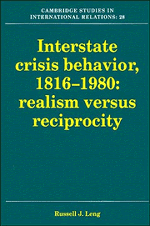Book contents
- Frontmatter
- Contents
- List of figures
- List of tables
- Preface
- 1 REALIST AND PSYCHOLOGICAL PERSPECTIVES
- 2 METHODOLOGY
- 3 THE CRISIS STRUCTURE AND WAR
- 4 PATTERNS OF BEHAVIOR
- 5 STRUCTURE, BEHAVIOR, AND OUTCOMES
- 6 INFLUENCE TACTICS
- 7 INFLUENCE STRATEGIES
- 8 RECIPROCATING INFLUENCE STRATEGIES
- 9 SUMMARY AND CONCLUSION
- EPILOGUE: THE 1990–1991 CRISIS IN THE PERSIAN GULF
- Appendices
- Notes
- References
- Index of names
- Index of subjects
- Titles in the series
EPILOGUE: THE 1990–1991 CRISIS IN THE PERSIAN GULF
Published online by Cambridge University Press: 05 February 2010
- Frontmatter
- Contents
- List of figures
- List of tables
- Preface
- 1 REALIST AND PSYCHOLOGICAL PERSPECTIVES
- 2 METHODOLOGY
- 3 THE CRISIS STRUCTURE AND WAR
- 4 PATTERNS OF BEHAVIOR
- 5 STRUCTURE, BEHAVIOR, AND OUTCOMES
- 6 INFLUENCE TACTICS
- 7 INFLUENCE STRATEGIES
- 8 RECIPROCATING INFLUENCE STRATEGIES
- 9 SUMMARY AND CONCLUSION
- EPILOGUE: THE 1990–1991 CRISIS IN THE PERSIAN GULF
- Appendices
- Notes
- References
- Index of names
- Index of subjects
- Titles in the series
Summary
The research for this book was nearing completion in the summer of 1990, when Iraqi forces invaded Kuwait and precipitated the larger crisis that led to a larger war six months later. The analysis of a current crisis presents obvious data generation problems, but the opportunity to apply what we had been doing with the historical cases to escalating crisis in the Persian Gulf was too tempting to resist. Using only the daily New York Times as a source for the event data, we decided to undertake a “quick and dirty” analysis. The results, however tentative, offer an interesting perspective on the Gulf crisis, as well as underlining some of the more general findings regarding the descriptive and prescriptive validity of realist and psychological perspectives on crisis behavior.
Background: the key events
What began as an economic dispute over oil prices between Iraq and its Persian Gulf neighbors, escalated to a militarized crisis during the summer of 1990, when Iraq charged that the Gulf monarchies were engaged in a plot to keep prices down, and that Kuwait was stealing oil from the disputed Rumailia oil field that straddled the Iraqi–border. By late July, Iraq had moved 100,000 troops to the border with Kuwait. Following a break-down in talks between the two states, Iraq invaded, conquered, and occupied Kuwait on August 2, 1990.
The Iraqi invasion was condemned as an act of aggression by the United States, the United Nations Security Council, and the Arab League. US President Bush declared that Saudi Arabia's security was of “vital interest” to the United States.
- Type
- Chapter
- Information
- Interstate Crisis Behavior, 1816–1980 , pp. 210 - 222Publisher: Cambridge University PressPrint publication year: 1993



